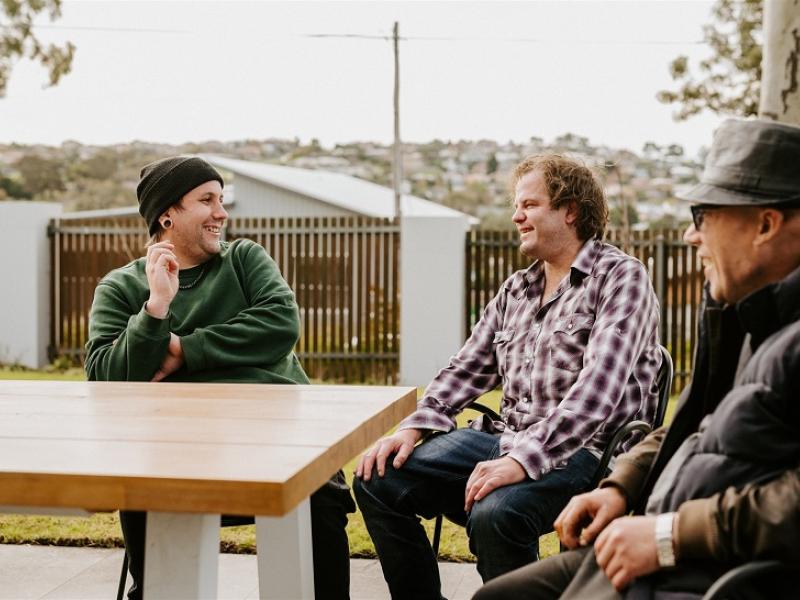Mind Australia is calling for NDIS reform to address the vital role housing plays in the recovery journey for people with significant mental health and wellbeing challenges.
Mind submitted the proposal for a new model of housing with mental health support for people with a psychosocial disability, as one of 10 recommendations in a paper submitted to the NDIS review, which is due to hand down its findings in October this year.
Psychosocial disability is a disability arising from mental health challenges which can limit an individual’s ability to function, think clearly, enjoy full physical health or manage their social and emotional welfare.
Ahead of national Homelessness Week, Mind CEO Gill Callister said for people with a psychosocial disability, recovery – living a meaningful life, alongside disability – is “inextricably linked with the access to housing with support”.
“There are more than 120,000 people experiencing homelessness on any given night in Australia. We know many of the people who access our services were experiencing or at risk of experiencing homelessness,” she said.
“Signs from the early years of the NDIS reveals that participants with psychosocial disability are at risk of experiencing unstable housing, financial exploitation, and homelessness.
“Mind’s research with the Australian Housing and Urban Research Institute confirmed a direct relationship between housing and mental health.”
The research showed a diagnosed mental health condition increases the likelihood that people will be forced to move from their home within one year by 39%, with the likelihood of financial hardship for people experiencing psychological distress increasing by 89% in the following year.
"People with psychosocial disability represent almost 18% of NDIS participants. Some will require long term housing with support to build their capacity and maintain a level of wellness whilst living with their disability.
“Others may require more intensive interventions over the short-to-medium term to initially build their capacity to live independently, then require less intensive ongoing support.
“We are proposing a continuum of support be available, including a nuanced recovery-focused model that can provide participants with flexible support to meet their goals. This proposal includes mechanisms to remove the structural pressures placed on innovative providers caused by fluctuating and opaque NDIS funding, eligibility, and pricing policies, so that they can deliver this essential support to participants with psychosocial disability."
The Haven effect
Mind’s submission proposes changes to eligibility criteria and funding structures to put recovery at the centre of housing with support, also known as Home and living support.
The model is based on the success of The Haven Foundation – part of the Mind Australia Group - whose integrated housing and support service provides long-term housing with 24/7 on-site support from Mind staff.
More than 15% of The Haven Foundation residents were experiencing homelessness before moving into a Haven residence in the past financial year alone.
Mark Heeney, The Haven Foundation’s Executive Director Housing Strategy, said the model is based on stable, secure, and supported accommodation - an essential component of a person’s recovery journey.
“Our research indicates that holistic approaches that integrate housing and mental health support with other support participant’s need are most likely to assist in recovery,” he said.
"People with psychosocial disability require a complex and nuanced balance of short-to-medium term, occasionally episodic, and often long-term support, to live a full and meaningful life in the community.
“An absence of appropriate housing undermines recovery, dignity, and wellbeing.”
The Victorian Government recently announced funding for eight new The Haven Foundation residences in Kilmore, Colac, Frankston, Corio, Sunbury, Wodonga, Wonthaggi and Traralgon. The eight new developments – part of the Homes Victoria $5.3 billion Big Housing Build – will create more than 106 homes and provide high quality, long-term housing with support so that their residents can work on their mental health recovery and live life to the fullest.
There are currently six Haven residences operating in Victoria, located in Frankston, South Yarra, Highton, Epping, Laverton and Mooroopna. A further five are currently being built in Drouin, Ballarat, North Bendigo, Seymour and Pakenham.
Planning is also underway for the first Haven residence in South Australia and the New South Wales Labor government has also committed to building the first three Haven residences in the state – with the first to be built on the Central Coast.
Mr Heeney said many people experiencing psychosocial disability have the capacity to improve their functionality and progress their recovery over time.
“We are encouraged that the concept of recovery is gaining appreciation within the NDIA. Psychosocial disability may include fluctuating and sudden episodes of being unwell and make everyday tasks difficult to complete and overcome.
“However, steps to recovery are possible with the right support.”
Housing with support in the NDIS
Mind’s submission also proposes strengthening workforce capacity and capability and embedding community and peer support into services.
“We strongly emphasise the need for any reform to be co-designed with people who have lived and living experience of mental health and wellbeing challenges and psychosocial disability,” Ms Callister said.
